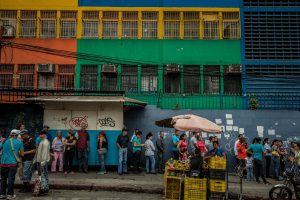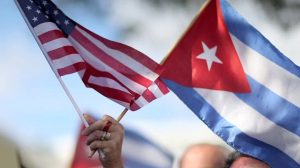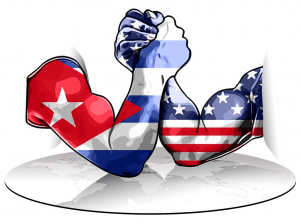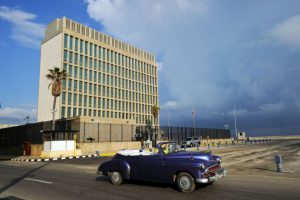
Category Archives: Noticias

Noticias Week 8- MS-13, Gang Violence, and Latin America

http://www.bbc.com/news/world-latin-america-41619802
A man believed to be a leader of the Mara Salvatrucha (aka MS-13) gang has been arrested in Guatemala recently. Ángel Gabriel Reyes Marroquín, or Blanco, as he is known, was found in a town 31 miles west of Guatemala City called Chimaltenango. Reportedly, Blanco was wanted for his involvement in an armed attack on a hospital two months ago. According to the article, Blanco and his fellow gangsters were attempting to liberate another one of their leaders, who was being treated at the hospital “under armed guard” of the Guatemalan police. Later, the article goes on to describe Blanco’s criminal history. In 2014 he was reportedly detained in a maximum security prison for charges that included murder, and furthermore, he is believed “to be connected to the deaths of at least 287 people”. However, he was able to escape and was not recaptured until now. The remaining parts of the article give a brief description of MS-13 and their crimes.
The existence of MS-13 itself reflects negatively upon Latin Americans. Although the gang was created in Los Angeles, it has its roots in Central America, specifically El Salvador, Honduras, and Guatemala. MS-13 is known as one of the most brutal gangs in existence, and they operate internationally. The fact that pretty much all members of MS-13 are of Latin American descent portrays Latin Americans in a negative light. However, I’d say that the article is hopeful. The fact that an important leader of MS-13 has been captured recently by Guatemalan police shows that MS-13 does not have complete control over Guatemala. More importantly, however, it shows that MS-13 is not a good representation of Latin Americans and their culture. I believe it’s safe to say that nobody likes MS-13 other than its own members. If Americans don’t like MS-13, how do you think Latin Americans feel about the gang? The same can be said about Muslims and ISIS. When a person or group is doing something that is giving your people and culture a bad name, you probably won’t like them, because the few extremists give the peaceful majority a bad name and a poor identity. Finally, I would say that the article shows that Latin Americans are doing their best to cope with and end the gang violence and crime that has such a strong hold on several Latin American countries.
I think it is also important to note the American perspective of MS-13 and the gang violence in Latin America. Many Americans are fearful of traveling to certain Latin American countries for fear of gangs, with good reason. Some people may look at the gang violence in places like El Salvador and believe that all Latin Americans are inherently violent people. However, I would hope that Americans who read this article are able to differentiate between the few violent gang members and the peaceful majority of Latin Americans who detest the gangs as much if not more than Americans.
Baile de Favela?: Talk of Banning Brazilian Funk
The article I chose primarily for this week is entitled “Why is there talk of banning funk music in Brazil?”.The article discusses how Brazilian funk is becoming an ostracized music genre due to the content and reoccurring themes in its songs. The article begins by comparing the alienation of the genre to Samba, also known as “Brazil’s most iconic and widely acclaimed musical style”. In the early twentieth century, notably under the Vargas dictatorship, Brazilians were persecuted and arrested for enjoying a music genre that symbolized their culture. This year Samba is celebrating its 100 years in Brazilian pop culture because its roots of being “the music of former slaves and their sons” was ultimately forgotten. Though it appears that Samba got its happy ending, its spot was just taken by Brazilian funk, now being criminalized for its content and its apparent encouragement of crime, drug trafficking, and inappropriate sexual encounters. Opponents of the musical genre took to Facebook to create a group called “Funk is garbage”, in order to collect signatures on the issue and encourage the presentation of a bill to Senate that would ban the genre altogether.
This bill was, in fact, sent to Senate, however, Senator Romario Feria assured that the ban on an entire musical genre was not “legally defensible ‘because of the right of free expression of thought guaranteed by the Federal Constitution’”. Reading this response from the Senate did not surprise me; as someone who is from the United States, the First Amendment of our U.S. Constitution assures the same right to free expression. BBC interviewed with Danilo Cymrot, a doctor in criminology, and he explained that there have been “other attempts to criminalize blacks, poor people, and favela residents” and one way to do that is to attack an aspect of pop culture that they are associated with, in this case, Samba and Funk.
The article makes the Brazilians who oppose Brazilian Funk look paranoid in my opinion. The article emphasized that those who oppose Brazilian funk did so because it was a bad influence on the Brazil’s youth. There were a lot of arguments saying that this style of music is a gateway to drug trafficking, drug consumption, irresponsible sexual encounters etc. Because I knew little about the topic beforehand I did question if any of these assumptions were warranted/ if there was anything that justified these strong thoughts on funk music. Brazilian funk and its reoccurring theme are most closely related to today’s Hip Hop and Rap in the United States. Hip Hop and Rap artists usually sing lyrics that tell rags to riches stories while their music videos portray drug use and the objectification of women, but it has become mainstream in our culture, especially among our youth. I came across a video that helped me understand more about why Brazilians might be so determined to eradicate the genre. About three weeks ago, reports were published of the Brazilian government having to shut down the largest favela in the country because of increased levels of drug violence. After watching this video, I began to understand why the impact of the music genre might be something that alarms Brazilians. I felt like after the army had to intervene in drug violence, citizens would do anything to ameliorate the issue. Perhaps the easiest way to begin the fight against drug trafficking, consumption, and other poor behaviors, was to attack a genre that portrays these aspects of culture as normal.

Our last class we began our new unit on music and dance. Music and dance are very important within different societies because they help to describe a specific cultural identity. These styles and genres might be popular throughout an entire country, maybe even continent, however when examined closer, there are slight variations that may occur based on a specific community or geographic region. I think this current issue in Brazil raises a lot of questions that are relevant to our new unit such as “Is it right to ban a music genre?” or even “If a genre IS banned, is the decision to do that ultimately disregarding parts of that culture?”.
Before choosing this article I had never heard Brazilian Funk, so I included one song (above) as well an Eminem song that you guys might be more familiar with as well. I thought it was really interesting to compare this Brazilian Funk song/music video to a music video by Eminem. “The Monster” was very popular in the United States a few years ago and touches on every theme that the Brazilian Funk genre is being criticized for within the first minute of the five-minute music video. I think it’s really interesting to see how the Eminem music video was received in the United States as another inspiring Eminem song about how he cleaned himself up after a rough past.
For anyone who’s interested in other Brazilian Funk songs here’s a list of 15 songs.
Nicolás Maduro’s Party Defies Polls in Venezuela Election
Venezuela, recently, has had a rough time from the bottom to the top. The country has experienced some serious economic and military downturns. Amid the economic crisis, and shortage of food, the country is now questioning their president if he has the ability to deal with the issues the country faces. The falling of the oil price is the major driven force for the country’s economic crisis, since the oil accounts for 95 percent of the country’s export revenue. In the hype of calling for a new government, the opposition party requests for a general election. But the election turns out be crooked.
During the general election, more than 200 voting site has been moved and people sometimes have to go to a distant and crime-ridden neighborhood or some voting sites simply don’t have power and people have to wait a long time before the power comes back. When the votes have been counted out, seventeen of twenty-two governorships vote for the existing president Maduro, while the opposition only have five. People doubt that the election is a fraud and needs a votes recounting. Nevertheless, the people still have faith in the country, just like one of the voter said, “at least we’re doing something.”
This news is correlated with our course theme because first, many Latin American countries have faced some serious societal disorders and people hardly live a decent life. It is a serious encounter that those countries need to tackle with and pay attention to. Countries, like Venezuela has to diversify their economic makeup in order to secure the economic stability. Second, the political leaders within the countries sometimes are trying to become the dictators. And it is a very prevalent scenario in some less-developed countries. Where there is a huge gap between the rich and poor, it is more likely to have uprising, dictatorship and corrupted government. The Latin American countries need a reformation so that they could restart their boomings. Start from a general election.
 https://www.nytimes.com/2017/10/15/world/americas/venezuela-election.html?rref=collection%2Fsectioncollection%2Fworld&action=click&contentCollection=world®ion=stream&module=stream_unit&version=latest&contentPlacement=2&pgtype=sectionfront
https://www.nytimes.com/2017/10/15/world/americas/venezuela-election.html?rref=collection%2Fsectioncollection%2Fworld&action=click&contentCollection=world®ion=stream&module=stream_unit&version=latest&contentPlacement=2&pgtype=sectionfront
Noticias Week 8
Previously in class we’ve talked about the lack of Latin American representation in media, and how the representation of Latin Americans that exists is often stereotypical and harmful (with most roles being maids or gang members). However, according to this article, that seems to be changing. While the article mostly focuses on global trends, it also highlights American companies like Netflix, HBO, Fox, Disney, Sony Pictures, and Time Warner Cable.
The article claims that the uptick in content being produced by and for Latin American countries is due in part to the success of Netflix which confirmed that they will be producing fifty original Latin American productions through 2018 alone. Another factor they mention is investments from other countries, demonstrating interest in Latin American television. Personally I think this is due to Netflix and other worldwide streaming networks that have the opportunity to show different types of content to people that may not otherwise be introduced to them, causing a rise in popularity and interest. Another reason is that as local TV companies are getting involved, causing healthy competition between networks, which in turn leads to competition and more improved content.
Due to this competition between companies, local TV networks in Latin America are producing their own content rather than just distributing the content of others. Since this gives viewers an alternative, companies like Sony, Fox, and Disney are forced to diversify and appeal more to their audience. HBO is developing talk shows in Mexico and Brazil, while Sony is producing seven series in Colombia and Mexico. With local TV networks diversifying and producing new content, networks like TNT are now distributing Latin American made content, creating partnerships that were unthinkable a few years ago. Another positive effect of competition is the rising quality of the content being produced. According to network representatives, until about 60 years ago the only shows produced in Latin America were telenovelas, and to compete, writers and directors have to change their style to better appeal to American and worldwide audiences, which very few writers and directors have experience with.
Noticias week 8
Is there a link between abortion rights and democracy?
Arroyo Navarrete, Larisssa. “Is there a link between abortion rights and democracy?” US News and World Report, Oct. 12th 2017

My article was about the link between abortion rights in Latin America. In Latin America there are often social stigmas or laws that prevent women from getting abortions. It is not uncommon for women to have secret “backstreet abortions” which very dangerous and can lead to death. Six Latin American countries ban abortions under all circumstances, outside of Latin America there are only two other countries in the world with the same abortion laws. Studies show that laws prohibiting abortions do not stop abortions from being performed and most Latin American countries do not ban abortions. One example of a country that demonstrates the correlation between abortion rights and democracy is Honduras. In 2009, a Honduran coup overthrew the government and brought violence to the area. As democracy left Honduras, abortion rights were restricted. In Nicaragua and El Salvador the situation is similar. In 2007 the president of Nicaragua ended term limits. Immediately after ending term limits, the president began to restrict abortion rights. In El Salvador the country is extremely violent and law enforcement is corrupt. In this country, a constitutional amendment fully criminalized abortion under any circumstances. ‘
This article does a good job of separating the people of Latin America from the corrupt regimes in specific countries. The article also does a good job of talking about specific Latin American countries rather than grouping them all together. Too often in the media, all Latin American countries are grouped together and talked about as one country which can be harmful when the article is discussing negative aspects of the countries involved. Finally, this article does a good job of balancing the good from the bad. Articles about Latin America often only talk about the problems with the countries discussed. This is a form of conditioning that makes people believe that Latin America is all bad. This is obviously not true and by talking about the successes in specific Latin American countries, this article offers a more even and realistic image of Latin America.
I picked this article because abortion laws and democracy are indicative of the status of women in Latin America. The criminalization of abortion in countries like El Salvador tells women that they are not valuable as human beings, instead women are often treated like “receptacles” for babies like the Colombian constitution says. This is a huge blow to the identity of women in Latin American countries like El Salvador. I think that this article did a good job of portraying Latin America and its citizens because it was written by a woman from Costa Rica. It is great that this article was picked up by an American news source. If more articles were written like this there would not be as strong of a social stigma surrounding Latin America and its citizens.
Noticias Blog Post: Intertwining of language in music
The article I chose this week is, Despacito’ Owned the Summer. What’s Next for Latin Pop? The article discusses how Despacito was number one on the charts from May -October 2017. The hit brought together two Puerto Rican artists from varying genres and an American teen idol. This strange combination of artists has opened up a door (so to speak) for Latin pop breakout songs like this. The article goes on to explain the positive outcome this song has created. Since it became so popular and grabbed audiences’ attention, artists have started to combine languages and musical styles more so than before. The cross-pollination of Latin genres has expanded and brought together various audiences. The article states how new artists have a unique experience by spending their lives in two different cultures. (United States and Latin locations) This creates a hybrid and new sound.The article goes on by referencing new remixes and collaborations between different artists and the use of two languages (Ex: Enrique Iglesias and Shakira) songs. This article foreshadows new music we can expect to see due to the success of intermingling of cultures, languages, genres, and artists.


Latinos are described as talented and revolutionary musicians in this article. They are creating a new style of music that incorporated different languages and it is becoming extremely popular. This could be a start to a completely new genre and way of expressing one’s identity. I think fans and audiences can relate to this cross cultural music due to their own backgrounds.
This article connects to our course themes specifically by focusing on musical identity and encounters with Latin culture. I chose this article due to this week’s focus. The article shows the interaction between Latin music and western/pop music. It also sheds light on how some artists (ex: Fonsi) were born in the U.S and have U.S influences on their music, as well as their original Latin culture. I think a lot of students can relate to this dynamic of being apart of two different cultures. I also think its important to note the positive impact of intertwining the two cultures, genres, and artists.
Noticias Week 8: Sonic Attacks
Staff and agencies. “Trump Says Cuba ‘Responsible’ for Alleged Sonic Attacks, but Offers No Evidence.” The Guardian, Guardian News and Media, 16 Oct. 2017.
(Pictured above is the U.S Embassy in Havana, Cuba)
Sonic Attacks?
Mysterious incidents that have been referred to as “sonic attacks” have occurred in Cuba over the past year, affecting a minimum of 22 American diplomatic workers who work in Havana at the U.S. embassy. The attacks have resulted with serious injuries with some American workers suffering from brain trauma and others with permanent hearing loss. It is evident that the impact of these ongoing sonic attacks have been severe, which has resulted in the media and many Americans to bring the issue to people’s attention.
Placing the blame on Cuba and conducting FBI investigations have been avoided because the relationship between Cuba and the United States has always been treacherous. In fact, only in 2015 did diplomatic relations between the United States and Cuba reopen. However, the FBI has recently traveled to the island and have conducted investigations, but the culprit or device that has induced such harm are yet to be discovered. Trump spoke this past Monday and revealed in a news conference that he believes that Cuba is responsible for these incidents. The fault with this statement, however, is that there is no evidence to support it. The government of Cuba has denied having any involvement or knowledge of the incidents. As noted in the article and something to be considered when evaluating this issue, “the U.S. has pointed to Cuba’s tight control over security in Havana and its close surveillance of Americans working there are reasons to believe that Cuba might know more about what’s transpired than it has let on” (Staff and agencies). The U.S. claims that under international law, it is Cuba’s duty to protect American embassy workers and the White House chief corroborates this by declaring that these incidents can be preventable if Castro’s government take action. Although investigations have been conducted and declarations have been said from both countries, the overall situation remains to be a rather murky one.

How will this impact U.S./Cuban relations?
As explained in history books and represented in the media, it can be known that tension has almost always existed between Cuba and the United States. Only recently (2015) has this fact changed. However, it is quite possible that with these so-called “sonic attacks,” tension will revert to how it was in the past. After reading the article, I gained the perspective that neither the United States nor Cuba are being portrayed in a positive light. As a preface, I do not know who or what is to be blame, but this is what I gathered after my reading of the article. Firstly, the United States appears to be acting as a bully, placing blame on the other when blame may not necessarily be due, especially since there is little evidence to support any allegations. The United States also seems to be instigating unnecessary melee. At the same time, Cuba appears to be weak because international law was not followed, American men were injured on their soil, and no proof was provided that they are not at fault, which only provokes the U.S. to make the claims that they have made. With these ongoing incidents, it seems as though peace and cooperation between the U.S. and Cuba will take a long time to attain.

Will Cuba and the United States be forever enemies?
The identity of Cuba in the perspective of the United States has been damaged with these recent sonic attacks, primarily because Americans have been harmed in Cuba. I find it to be rather unfortunate because as diplomatic relations were in the early stages of restoration, incidents like these have taken place and have caused tensions to rise. One can say that the identity of the United States as a superpower is also amplified because of the blame it has placed on Cuba.
A major international encounter between Cuba and the United States is being represented in this article. With both past events and the diplomatic relations reopening in 2015, this recent negative encounter makes one wonder how future relations between Cuba and the United States will be affected.
Noticias Week #
This article is mainly about the affects of President Trump hinting at military intervention in Venezuela. As expected the out come of this unexpected comment led to large amounts of controversy and negative backlash. Mainly since no one knew the President would say this and it entirely goes against the agenda of his defense committee who solemnly dismissed the claim. This claim also caused trouble for Vice President Pence who had a trip scheduled for several Latin American Countries days after Trump made this remark. Which led to many of the leaders of these countries worrying about military action in Latin America.
This comment arose mainly because of the turmoil that has been ongoing in Venezuela, in addition to this the country has been declared a dictatorship by a committee of nations. By threatening intervention this brings back fears of the cold war era where we sent troops to various Latin American countries for various reasons.
In my opinion I believe that this comment was completely uncalled for, it is also highly unprofessional to say. This is because it goes against the agenda of his defense committee and puts his Vice President in a very unfavorable position while touring Latin America. Also threatening military action without having just reason too is heinous and wrong.
Noticias Discussion Questions Week 7: The Identity of Puerto Ricans as Americans
Read the posts by Brooks and Kyrsten on the current crisis Puerto Rico and how it is being handled by the American government and American celebrities.
Discussion Questions:
- How does the response time of the American government to the crisis in Puerto Rico reflect the way Americans perceive Puerto Ricans?
- Do you believe that Puerto Ricans are citizens just like other Americans, and are they treated as such?
- What is the American government doing to help the situation in Puerto Rico? Is it enough? Is the aid given to the citizens of Puerto Rico comparable to the aid given to other areas of the US affected by natural disasters, such as Texas?
- What role can celebrities play in times of national crisis? How can they help those affected by disaster?
- What are celebrities doing to help? Is it enough? To what extent are celebrities responsible for helping in times of crisis?
- Do Puerto Rican celebrities have a greater responsibility to Puerto Rico than other American celebrities?
- Who has a greater amount of responsibility to giving aid to those affected by crises, politicians or celebrities/CEOs/etc.?
Here is an interesting article for context: https://www.nytimes.com/2017/09/26/upshot/nearly-half-of-americans-dont-know-people-in-puerto-ricoans-are-fellow-citizens.html



